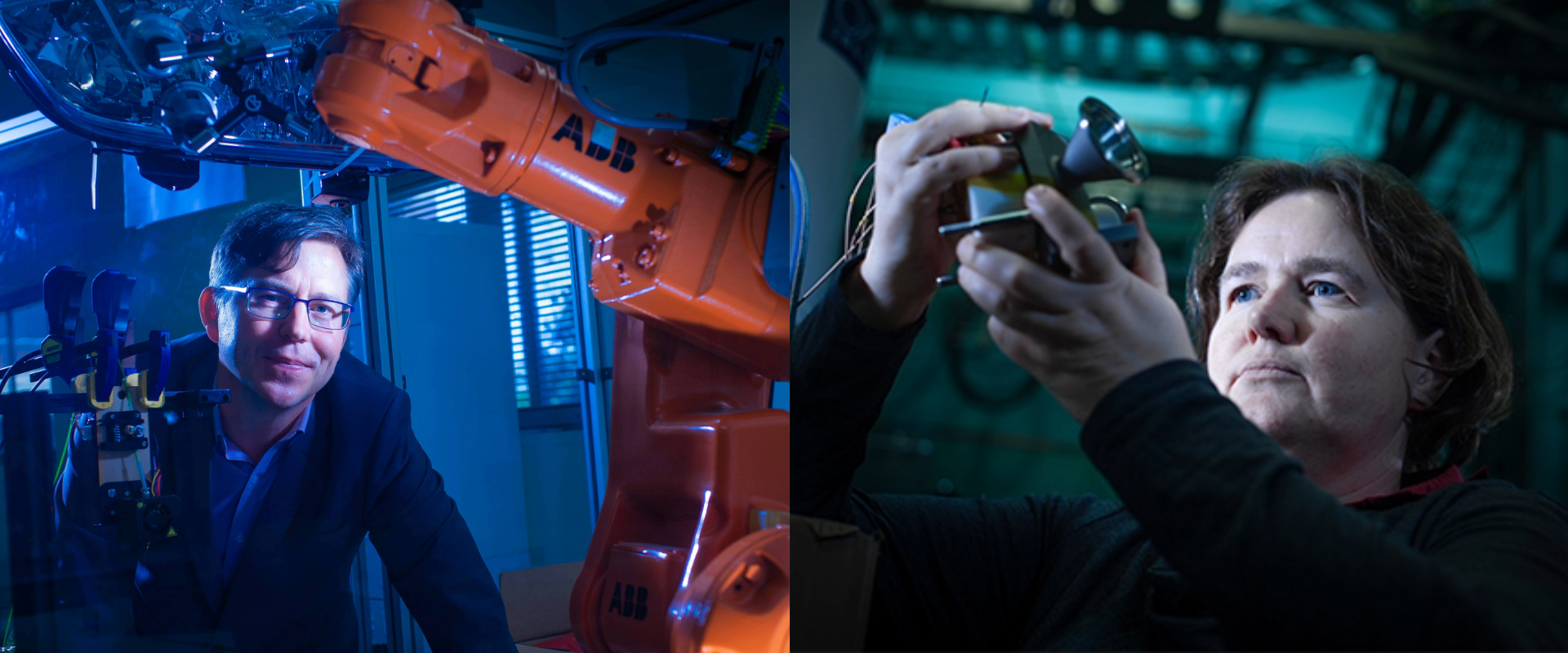Swinburne to advance cardiac care and asbestos detection with industry-engaged grants

(left) Professor Mats Isaksson and (right) Associate Professor Rosalie Hocking will lead innovative artifical intellgence projects through two grants from Australia's Economic Accelerator Ignite program
In summary
Swinburne has secured two grants from Australia's Economic Accelerator Ignite program to support innovative commercialisation projects
Led by Professor Mats Isaksson, one project will advance remote cardiac care through AI-driven robotic system, delivering fast and accurate heart examinations for patients in remote areas
Led by Associate Professor Rosalie Hocking, a second project focuses on developing AI-based asbestos detection technologies to make inspecting hazardous materials faster and cheaper
Swinburne University of Technology has received funding in the latest round of Australia's Economic Accelerator (AEA) Ignite program.
Swinburne researchers have been awarded close to $740,000 to advance two innovative artificial intelligence projects, securing a portion of over $59 million shared across 155 nationally significant commercialisation projects.
The AEA Ignite grants aim to support transformative research commercialisation, fostering innovation and economic growth in key sectors.
Swinburne’s Vice President, Innovation and Enterprise, Dr Werner van der Merwe says the funding highlights the vital role Australian universities play in taking cutting-edge research from lab to market.
"AI is a rapidly advancing technology with great benefits for early adopters, driving cross-sector productivity and supporting national priorities. Australia’s strong AI research, coupled with unique data sources, creates significant demand for AI tools. Swinburne will leverage this capability to boost productivity and develop scalable AI solutions for industries worldwide."
AI-enhanced robot for remote cardiac care
A project led by Professor Mats Isaksson, titled ‘AI-Enhanced Haptically-Enabled Robot for Teleoperated Echocardiography’, has received $348,004 in funding. This project focuses on advancing teleoperated echocardiography systems, leveraging AI and robotic technologies to enhance remote cardiac care.
“The AEA Ignite grant enables us to significantly advance our existing platform for teleoperated echocardiography, so heart specialists can perform remote ultrasound examinations in real-time. With this funding, we’ll enhance our system by integrating AI-driven automation and satellite connectivity, ensuring reliable remote ultrasound examinations, even in areas with limited access to specialists, 'says Professor Mats Isaksson.
“The project has the potential to transform healthcare delivery, reduce wait times, improve, diagnostic accuracy and make critical heart assessments more accessible for patients in regional and remote communities.”
The innovative project stems from Swinburne PhD research by Dr Mauricio Hidalgo Florez and Dr Mariadas Roshan under the supervision of Professor Mats Isaksson. In addition, the project’s team includes Associate Professor Hailing Zhou and Professor Gavin Lambert, along with collaborators from RMIT University and the Baker Heart and Diabetes Institute.
AI-enhanced asbestos detection technology for faster information about hazards
A second project, led by Associate Professor Rosalie Hocking, will develop advanced asbestos detection technologies using AI and robotics. This initiative aims to enhance the safety and efficiency of hazardous material inspections, a critical step in improving public health and environmental safety. These technologies are designed to improve the accuracy, speed and safety of asbestos detection, which is crucial in preventing health risks related to exposure.
The project team includes Swinburne’s Dr Dana Rezazadegan, Dr Abdur Forkan, and Vince Lorefice, and industry partners Agon Environmental, Identifibre and Asbestossa, who will provide expertise in environmental solutions, asbestos testing, and hazardous materials inspections and reporting.
“Our group built and developed an AI-based asbestos sensor, which achieves 90 per cent precision in field testing. However, to take it further we need to expand testing across Australia,” says Associate Professor Hocking.
“Asbestos in building materials can look different in different parts of Australia. This funding is critical – we can’t release a product without knowing its strengths and weaknesses in all environments.”
-
Media Enquiries
Related articles
-

- Student News
- Science
- Sustainability
Introducing tomorrow’s global science communicators
Start Talking is Swinburne’s unique video-based public speaking competition, exclusively for undergraduate students
Monday 08 December 2025 -

- Astronomy
- Technology
- Health
- Science
- University
- Sustainability
- Engineering
Swinburne highly cited researchers reach the top in 12 fields
Ten Swinburne academics have been named on the Highly Cited Researchers 2025 list, released by Clarivate
Tuesday 02 December 2025 -

- Science
- Engineering
Swinburne secures grant to advance next-generation metamaterials research
Swinburne physicist Dr Weibai Li has received a Discovery Early Career Researcher Award from the Australian Research Council
Tuesday 02 December 2025 -

- Technology
- Health
- Science
- University
$1.2m ARC funding to boost national X-ray spectroscopy capability through Swinburne and QUT partnership
Swinburne has secured $1.2 million in the latest Australian Research Council Linkage Infrastructure, Equipment and Facilities scheme round
Tuesday 02 December 2025 -

- Astronomy
- Technology
- Science
- Engineering
Meet Swinburne’s Roo-ver Mission team
Roo-ver will be Australia's first lunar rover, and it’s being designed, built and tested in Australia. Swinburne is playing a key role in the design and construction of Roo-ver, through its involvement in the ELO2 Consortium.
Wednesday 26 November 2025

